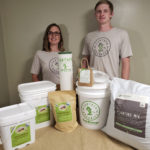ACRE Awards Seven Entrepreneurs Funding for Their SC Agribusinesses
ACRE Awards Seven Entrepreneurs Funding for Their SC Agribusinesses
Story by Jeremy Ward, Agribuisness Center for Research and Entrepreneurship
This story appears in the July 16, 2020 issue of the South Carolina Market Bulletin.
As South Carolina begins the fierce drive back from the economic shock of COVID-19, agribusinesses will be leading the way in our rural towns. Whether farms have been in business for 300 years or a few months, all have a vital contribution to make to our state’s recovery.
With this in mind, the Agribusiness Center for Research and Entrepreneurship (ACRE) was proud to award grants to seven innovative, hard-driving farms around the state this spring. These grants were up to $30,000, but varied by awardee. ACRE will help advance these businesses in the marketplace through mentoring, networking, and funding as part of our mission to strengthen rural South Carolina.
 Kristen Beigay
Kristen Beigay
Earthen Organics
Located in Easley, Kristen Beigay and her team have an unusual business goal: to create soil. By harnessing the power of the humble earthworm, Earthen Organics is churning out high-quality organic fertilizer in the form of worm castings to farmers and gardeners in Anderson County and beyond.
Beigay explains that “chemical-driven farming methods continue to deplete nutrients and biological life from the soil they work. We aim to rehabilitate and replenish the soil while also helping our customers grow healthy, hearty plants.” Her natural fertilizer has a threefold purpose – providing immediate nutrients to plants, suppressing insects and pathogens, and diverting local food waste at the same time.
With their ACRE grant, Earthen Organics will create an online store for direct-to-consumer sales, as well as purchasing new machinery to allow creation of custom soil mixes.
Ben Crawford and Rebecca Goldberg
Woodland Valley Mushrooms
Based out of Jackson in Aiken County, Woodland Valley uses climate-controlled shipping containers to intensively grow gourmet mushrooms. Their current product line includes oyster, shiitake, lions mane, and maitake mushrooms, all of which are in high demand across the state.
Their unique business model alone stands out, as does their commitment to improve the local economy of Aiken through job creation and agricultural education. With the ACRE grant, they intend to purchase the equipment necessary to ramp up mushroom production sixfold.
“Our passion is promoting health and sustainability through agriculture,” says Goldberg. “With this expansion we will create jobs in our rural community and have an impact on regional food security while bringing a slice of the $1.5 billion national mushroom market to South Carolina.”
 Michelle Ducworth
Michelle Ducworth
Twin Creeks Lavender
If you’ve never seen the beauty of a lavender farm, with its rows of brilliantly purple flowers, you might be forgiven – after all, there are not too many around. Twin Creeks Lavender, based in Williamston (Anderson County), holds the distinction of being one of the only lavender farms in the state. They are unequivocally the only lavender farm offering U-Picks, and also create a score of value-added lavender products themselves.
As an organic farm growing a flowering herb, Ducworth realizes that her position is fairly unique. It is that uniqueness that has helped power the farm’s growth. Ducworth enjoys “showing folks that a large operation can be run organically, and that you don’t have to farm something edible to have a beautiful revenue-generating farm.”
With the ACRE grant, Twin Creeks will construct a new drying barn, which they anticipate will double their production and sales capabilities.
 Alicia Holbrook
Alicia Holbrook
Carolina Pride Pastures
Diversification has been a key word for the survival of the modern farm, and agritourism has been an integral part of many farmer’s financial plans. Alicia Holbrook, raising alpacas for their fiber in Pomaria (Newberry County), was one such farmer. The disruption caused by an untimely pandemic required agritourism itself to diversify, and Holbrook met the challenge head-on.
She has created a virtual educational program for her farm, intended to show travel-restricted classrooms the wonders of an alpaca farm. “Our virtual field trips,” she says, “will showcase the diverse agriculture in South Carolina to the entire nation and hopefully the world. Our programs show how leveraging new technology and new thinking can advance agriculture beyond the pastures and fencing.”
 Patrick Myers
Patrick Myers
Lowcountry Creamery
Talking with Patrick Myers leaves you with one singular impression: He’s a fan of cows. As part owner of the Bowman-based dairy and creamery, Myers and his partners plan to take their herd of Jersey cows and wide product line exclusively to the direct consumer.
The nutritious value of Jersey milk is well-known yet somewhat exclusive, and the plan is to increase supply of their products to the consumers in Orangeburg County and beyond.
“Our product mix,” Myers explains, “allows us to stand alone. We are the only greek yogurt and crème fraiche producers in the state and we plan to add other products with our next expansion, including but not limited to flavored yogurts, cheeses, and ice cream.”
 Caci Nance
Caci Nance
Nance Farm Creamery
As a 12th generation dairy farmer in the small town of McConnells (York County), Caci Nance witnessed the collapse of historic dairies across the country, and realized that it was time to reorganize. She and her husband William recognized the lack of fresh dairy products in the York/Chester area, and founded the creamery to both save their dairy and address this problem.
As the only creamery in the area, the Nances plan to supply the local community with their milk directly, filling a gap in local food availability. Caci explains that “the ACRE grant is a wonderful kickstart to our creamery helping provide us with the funds for refrigeration equipment, marketing and bottling cost.”
 Matthew and Kara Rutter
Matthew and Kara Rutter
Project Victory Gardens
There is an oncoming crisis in agriculture, as current farmers are aging and not enough new farmers are filling the ranks. Based out of Aiken, the Rutters have a plan to tackle this problem. With a cumulative 45 years of service in the U.S. Army, they have witnessed both the toll of military service and the skills that translate well to agriculture.
Thus, they created Project Victory Gardens, a diversified farm on 20 beautiful acres. Conveniently located to major military bases, their mission is both to heal and educate veterans through resiliency training and agricultural education.
“By educating and encouraging veterans to enter agribusiness,” Matthew says, “Project Victory Gardens will help to reduce the age of American farmers while providing an employment opportunity which will naturally increase food security across our great state.” With their ACRE grant, they plan to construct a certified farm kitchen to aid in their education efforts.
Like what you see? Subscribe to the Market Bulletin here for just $15 a year.





